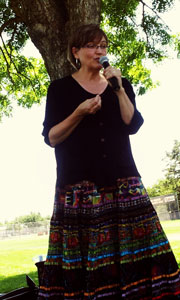By Pam Faro
 I was about to hit “Send” on the blog piece I’d finally completed, inviting readers on a little trip down my memory lane about how this girl who was raised in White, Christian, middle-class, 1960s-70s Midwestern America came to be offering a 3-hour intensive on “Interfaith Storytelling” at this month’s National Storytelling Conference…
I was about to hit “Send” on the blog piece I’d finally completed, inviting readers on a little trip down my memory lane about how this girl who was raised in White, Christian, middle-class, 1960s-70s Midwestern America came to be offering a 3-hour intensive on “Interfaith Storytelling” at this month’s National Storytelling Conference…
…and then I saw the Monday morning news from London, of the van plowing into and terrorizing a group of pedestrians just coming out from their mosque from Ramadan evening prayers.
You know how when you’re from a place, or have visited there, or have loved ones there, or have stories in your repertoire from a place or culture…? – How when you have some connection to a place, news from there strikes you even more deeply/sharply than “just reading about it?” Well, I recently came back from a two-and-a-half-week sojourn in England (my 4th time, including having lived there in the mid-70s)…
…so I threw out the piece I’d written-and-tweaked this past week, and started from scratch.
In all the terribly many ways we humans mark our boundaries, claim our specialness, proclaim our superiority over others, and create chasms of separation – religious differences are often at the forefront and/or the root. In recent years, and in recent weeks, it’s been especially true. There is so much suspicion and misunderstanding and ignorance and fear and anger and violence and anxiety and misapprehension.
Most storytellers seem to know the saying, “The shortest distance between two people is a story.”
Now more than ever we need to share stories across faith boundaries that distance us.
- We need to hear stories from other faiths, to allow and invite others to tell them, and to listen to them.
- We need to learn and value traditional stories from not only other lands and cultures like many of us do, but also other faiths and spiritual traditions.
- And we need to tell our own stories, our personal-experience stories of spiritual journeys and values as well as the traditional stories handed down to us.
The human spirit has many modes of expression, many avenues of pursuit, many sources to draw upon for fulfillment, for community, for living creatively and well and abundantly. We as storytellers KNOW that the arts in general and storytelling in particular (whether we consciously think about it or not) are spiritual endeavors: endeavors of the human spirit that reach for and touch the ineffable. Those areas of human experience called “religion” or “faith” – so vast and complex across humanity – are where we most easily and commonly limit considerations of “spirituality.” But we storytellers deal in things of the spirit all the time.
Hearing each other’s voices across differences and divisions of faith and religion is desperately needed today, more than ever. Storytelling is uniquely powerful in enabling communication and relationship. In the Interfaith Storytelling workshop I offer, I invite you to consider the spiritual power of storytelling, to explore the riches of intentionally sharing stories across faith traditions, and to be provoked and inspired by hearing stories from “the other.” It can help heal brokenness, connect communities, feed the spirit.
I’ve given this workshop coast-to-coast in recent years, always striving to make it better, taking participants’ evaluations to heart. In addition to any suggestions made, I’ve always overwhelmingly received two general responses from participants: They really like and value the process and content, and, “It needs more time than an hour-and-a-half!”
So I’m really gratified to be offering a 3-hour intensive, “Hearing Each Other’s Voices – Spiritual and Interfaith Storytelling,” at this year’s NSN Conference in Kansas City. In it we’ll have a bit more time to explore the power of sharing stories across faith traditions, and truly hearing each other’s voices.
Hanuman the Monkey King went to see Lord Brahma, creator of the universe. Lord Brahma was weeping. “My Lord, what is wrong? Why are you crying?” Hanuman asked.
“Oh, dear Hanuman, I held the jewel of wisdom in my hands. It was so beautiful. But I dropped it, and it shattered into millions of pieces.” Brahma wept even harder.
“I see,” said Hanuman. “You dropped and broke the jewel; that is why you are crying.”
“No,” Brahma replied. “I’m crying because everyone who has found a piece of that jewel of wisdom believes they have the only piece.”
[Adapted from The Treasure in Your Heart – Yoga and Stories for Peaceful Children by Sydney Solis, and included in the “Interfaith Storytelling” issue I was privileged to guest-edit for the Oct-Nov-Dec 2016 Storytelling Magazine.]
About Pam
Having been a single mom, Pam Faro is grateful to have been able to support her family by storytelling – and now loves to tell to her grandkids! Since 1988 Pam has performed and taught across the US and overseas – from festival stages to classrooms and libraries, from conference keynotes to outdoor ed to church retreats. Her extraordinary embodiment of stories serves as model and springboard for coaching others and for the skills workshops she designs. Pam tells world-folktales, Spanish-English bilingual cuentos, biblical and interfaith stories, and true-life tales, including of her great-uncle who survived the Titanic (that’s quite a story).
Contact Pam
Website: www.storycrossings.com
Email:
